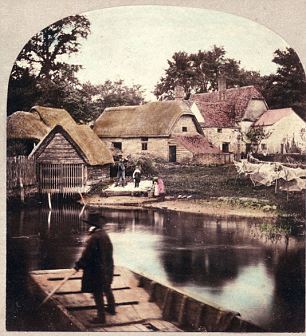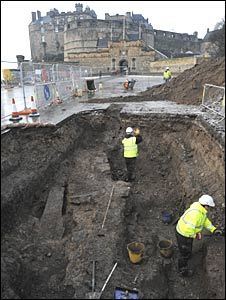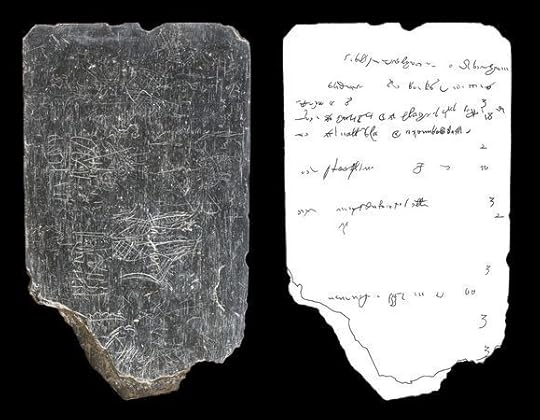Michelle Moran's Blog, page 109
January 16, 2010
Victorian Rhapsody: Queen guitarist Brian May on the photos of a forgotten Britain that became his secret obsession

BRIAN MAY WRITES: A magnificent 1850s view of the river - tranquil with a hint of suspense. Across the water lies Ferry Farm, busy with goods for the village of Hinton Waldrist, to be delivered by ferry. To the right we can see nets drying
By BRIAN MAY
When I was about 12 years old, Weetabix gave away a series of 3-D picture cards featuring animals - you would find them nestling between the box and the inner bag. The idea was that you could send off for a special 'Vista-Screen' viewer which, ...
January 15, 2010
Medieval defences found at Edinburgh Castle
 Archaeologists made the discovery during work to build new Tattoo stands
Archaeologists made the discovery during work to build new Tattoo stands Late medieval walls and the foundations of what appears to be a military spur, which formed part of the outer defences at Edinburgh Castle, have been found.
Read the rest on the BBC.
January 14, 2010
Mysterious Jamestown Tablet an American Rosetta Stone?

A conservator digitally isolated inscriptions (right) on the 17th-century Jamestown tablet (left).
Paula Neely
for National Geographic magazine
Read the rest on National Geographic.
Sailing into antiquity
The archeological digs at Egypt's Wadi Gawasis have yielded neither mummies nor grand monuments. But Boston University archeologist Kathryn Bard and her colleagues are uncovering the oldest remnants of seagoing ships and other relics linked to exotic trade with a mysterious Red Sea realm called Punt.
On a mission to crack the Norse code
The wind whipped the waves of Scapa Flow into streamers of white froth, and the swell built to a stomach-churning height.An announcement came over the Tannoy – our ferry would just make it in to Stromness, but its return journey to Scrabster would be cancelled. The other passengers took in this information without a murmur. Orcadians know that they are cut off, that they live in a world apart.
Read the rest here.
January 12, 2010
East Yorkshire gas storage facility making historic discoveries - Iron Age sword found at Centrica site, Caythorpe
Read the rest here.
Laminated Linen Protected Alexander the Great
By Rossella Lorenzi
A Kevlar-like armor might have helped Alexander the Great (356–323 B.C.) conquer nearly the entirety of the known world in little more than two decades, according to new reconstructive archaeology research. Presented at the annual meeting of the Archaeological Institute of America in Anaheim, Calif., the study suggests that Alexander and his soldiers protected themselves with linothorax, a type of body armor made by laminating together layers of linen.
Read the rest on...January 11, 2010
Egypt tombs suggest pyramids not built by slaves
CAIRO (Reuters) - New tombs found in Giza support the view that the Great Pyramids were built by free workers and not slaves, as widely believed, Egypt's chief archaeologist said on Sunday.
More on Neanderthal 'make-up' containers discovered
Scientists claim to have the first persuasive evidence that Neanderthals wore "body paint" 50,000 years ago. The team report in Proceedings of the National Academy of Sciences (PNAS) that shells containing pigment residues were Neanderthal make-up containers.
Read the rest on the BBC.January 10, 2010
Signatures may prove William Shakespeare was a secret Catholic who spent his 'lost years' in Italy
THREE mysterious signatures on pages of parchment bound in leather and kept under lock and key may prove the theory that William Shakespeare was a secret Catholic who spent his "lost years" in Italy.
Read the rest here.



